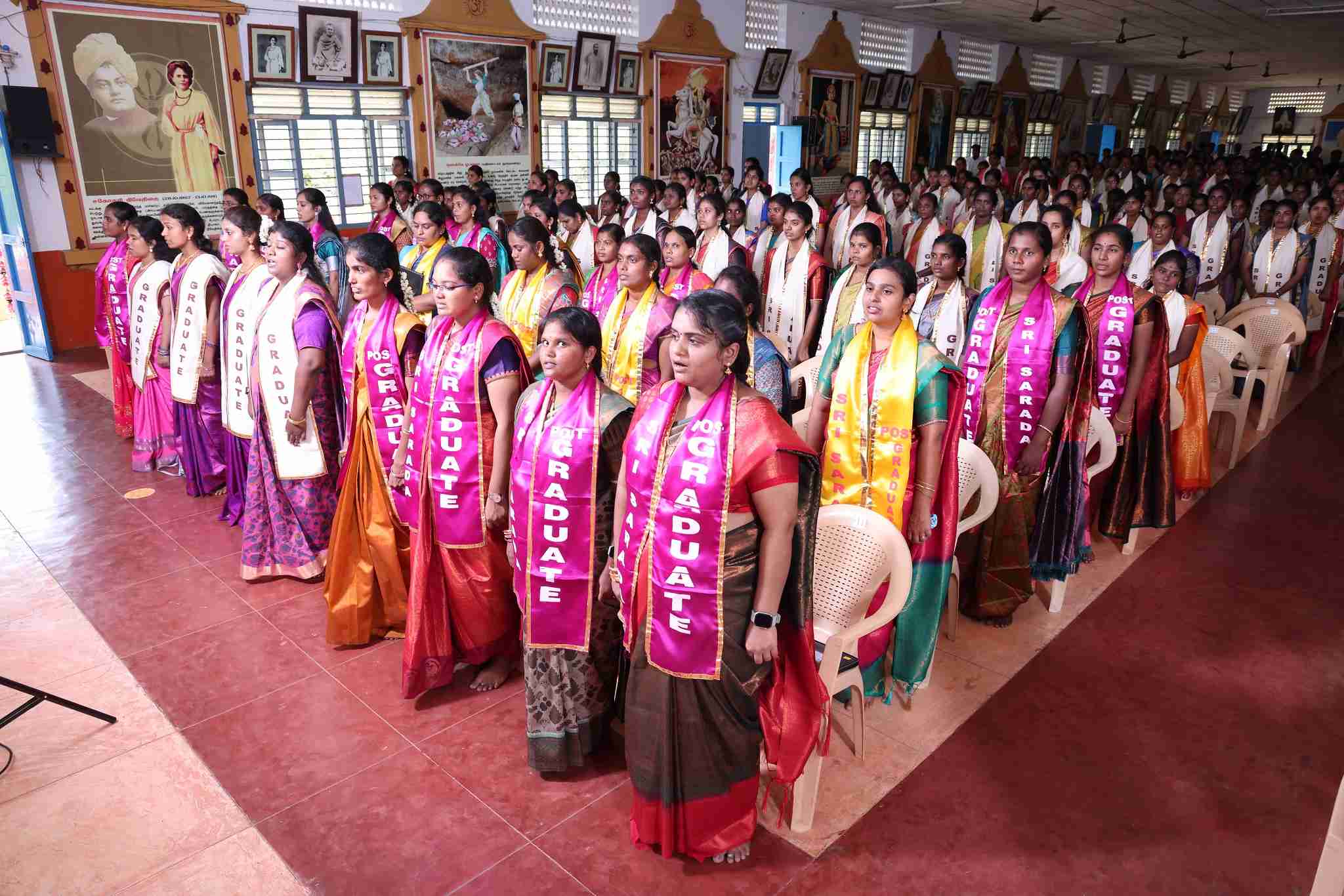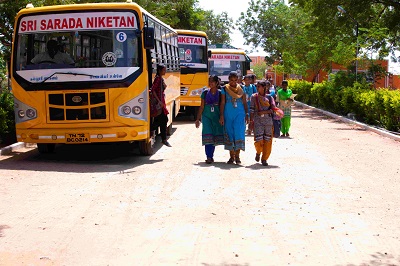Facilities
SCHOLARSHIP
Our institution is supporting the single parent, financially backward, orphans and merit children by way of providing full/part free fees concession for students towards academic, hostel and food requirements. The institution also provides fees concession of 100 % for the students who scores above 550 marks,75% for the students who scores above 500 marks and 50 % concession for the students who scores above 450 marks in Higher Secondary Examination. SC/ST students are offered scholarship by the Government through Minority Welfare Board. Minority community students, single Girl Child and Ulazhavar Card holders also get scholarships
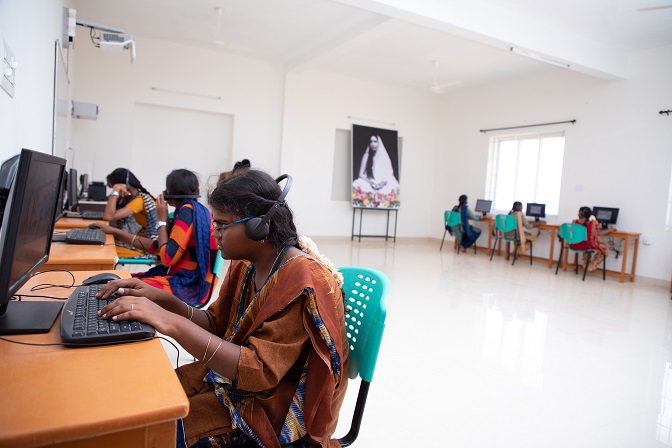
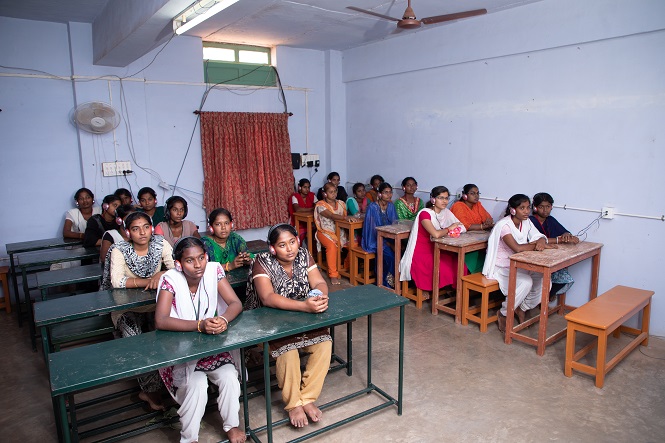
LANGUAGE LAB
The language laboratory is very useful for assessing students' speech. It provides students with the technical tools to get the best samples of pronunciation of the language. The electronic devices used in the laboratory will stimulate the eyes and ears of the learner to acquire the language quickly and easily. The laboratory’s collection is designed to assist learners in the acquisition and maintenance of aural comprehension, oral and written proficiency. The students can get the experience of having interaction with native speakers through the laboratory. The language laboratory has become the need of the hour in any language learning process for communication.
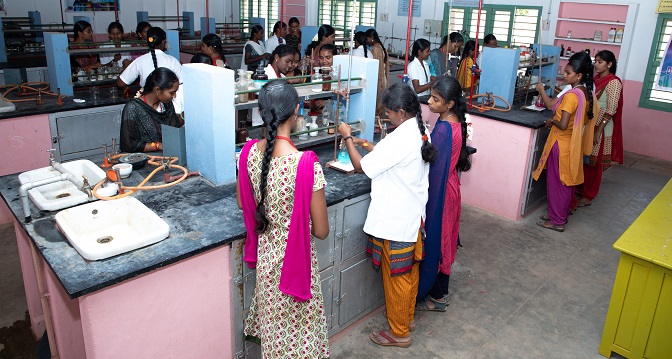
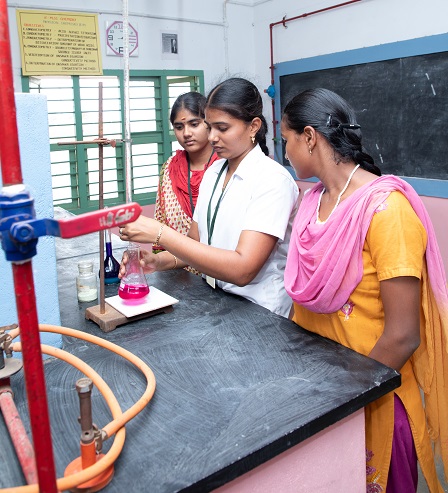
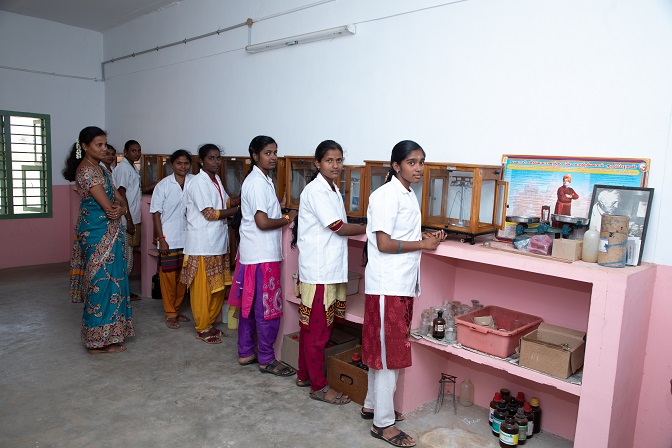
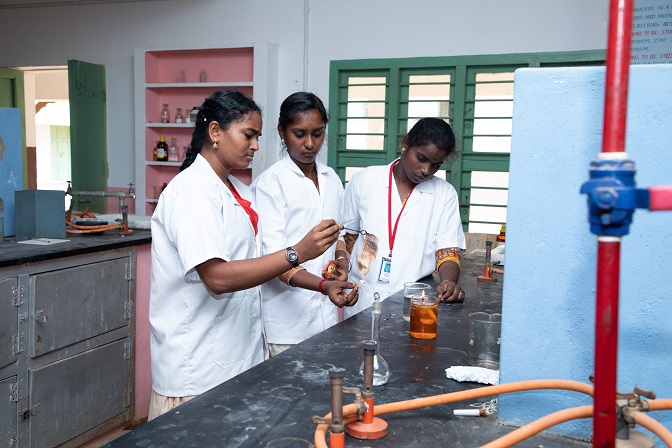
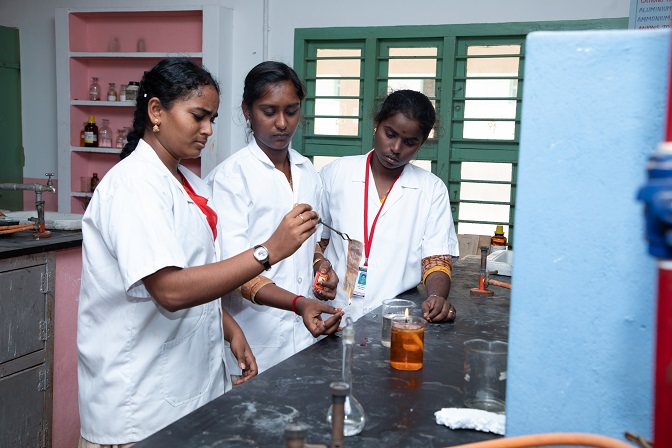
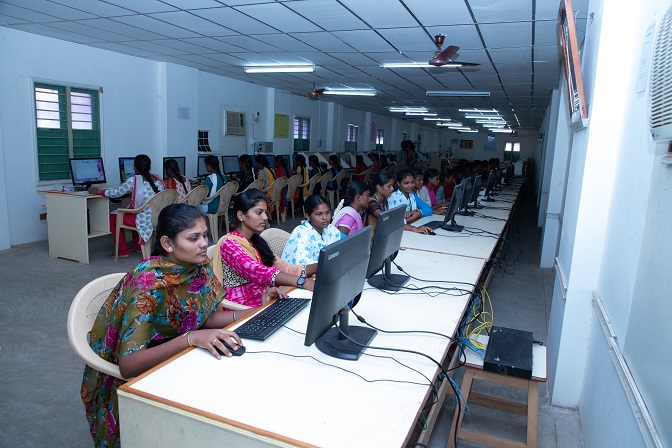
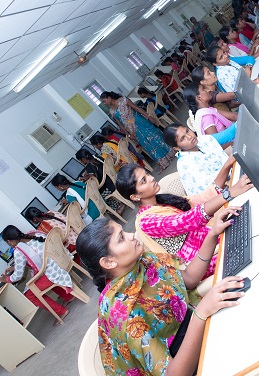
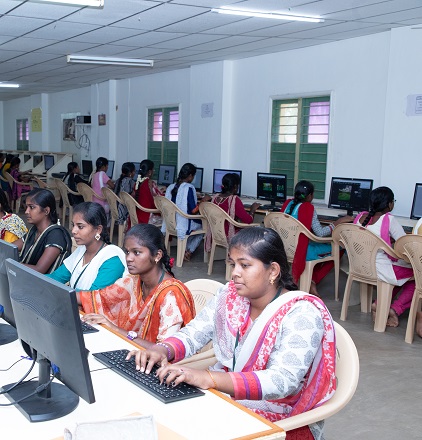
LABORATORIES
OVERVIEW:
A laboratory is a facility that provides controlled conditions in which scientific or technological research, experiments, and measurement may be performed. In our college we have defined well established laboratories in the departments of Physics, Chemistry, Computer science,microbiology etc.
PERSONAL AND GENERAL LABORATORY SAFETY:
Never eat or drink anything while working in the laboratory.
Read labels carefully.
Do not use any equipment unless you are trained and approved as a user by your supervisor.
Wear safety glasses or face shields when working with hazardous materials and/or equipment.
Wear gloves when using any hazardous or toxic agent.
Clothing: When handling dangerous substances, wear gloves, laboratory coats, and safety shield or glasses.
If you have long hair or loose clothes, make sure it is tied back or confined.
Keep the work area clear of all materials except those needed for your work. Coats should be hung in the hall or placed in a locker. Extra books, purses, etc. should be kept away from equipment that requires air flow or ventilation to prevent overheating.
Students are responsible for the proper disposal of used material if any in appropriate containers.
If a piece of equipment fails while being used, report it immediately to your lab assistant or tutor. Never try to fix the problem yourself because you could harm yourself and others.
If leaving a lab unattended, turn off all ignition sources and lock the doors.
Clean up your work table area before leaving.
Wash hands before leaving the lab and before eating.
Avoid wastage of water and use judiciously.
ELECTRICAL SAFETY:
Obtain permission before operating any high voltage equipment.
Maintain an unobstructed access to all electrical panels.
Wiring or other electrical modifications must be referred to the Electronics Shop or the Building Coordinator.
Avoid using extension cords whenever possible. If you must use one, obtain a heavy-duty one that is electrically grounded, with its own fuse, and install it safely. Extension cords should not go under doors, across aisles, be hung from the ceiling, or plugged into other extension cords.
Never, ever modify, attach or otherwise change any high voltage equipment.
Always make sure all capacitors are discharged (using a grounded cable with an insulating handle) before touching high voltage leads or the "inside" of any equipment even after it has been turned off. Capacitors can hold charge for many hours after the equipment has been turned off.
When you are adjusting any high voltage equipment or a laser which is powered with a high voltage supply, USE ONLY ONE HAND. Your other hand is best placed in a pocket or behind your back. This procedure eliminates the possibility of an accident where high voltage current flows up one arm, through your chest, and down the other arm.
ELECTRICAL SAFETY:
Treat every chemical as if it were hazardous.
Make sure all chemicals are clearly and currently labeled with the substance name, concentration, date, and name of the individual responsible.
Never return chemicals to reagent bottles. (Try for the correct amount and share any excess.)
Comply with fire regulations concerning storage quantities, types of approved containers and cabinets, proper labeling, etc.
Use volatile and flammable compounds only in a fume hood. Procedures that produce aerosols should be performed in a hood to prevent inhalation of hazardous material.
Never allow a solvent to come in contact with your skin. Always use gloves.
Never 'smell' a solvent!! Read the label on the solvent bottle to identify its contents.
Dispose of waste and broken glassware in proper containers.
Clean up spills immediately.
Do not store food in laboratory refrigerators.
ADDITIONAL SAFETY GUIDELINES:
Never do unauthorized experiments.
2Never work alone in the laboratory.
Keep your table and lab space clean and organized.
Do not leave an on-going experiment unattended.
Always inform your instructor if you break a thermometer. Do not clean mercury yourself!!
Never taste anything. Never pipette by mouth; use a bulb.
Never use open flames in laboratory.
Check your glassware for cracks each time while you use it. Cracks could cause the glassware to fail during use and cause serious injury to you or lab mates.
Maintain unobstructed access to all exits, fire extinguishers, electrical panels, emergency showers, and eye washes.
Do not use corridors for storage or work areas.
Do not store heavy items above table height. Any overhead storage of supplies on top of cabinets should be limited to lightweight items only.
Areas containing lasers, biohazards, radioisotopes, and carcinogens should be used carefully.
Be careful when lifting heavy objects or glass containers.
Clean your lab bench and equipment, and lock the door before you leave the laboratory.
RULES AND REGULATIONS:
Some of the abilities which may be developed and evaluated during practical work are the following:
1. to handle equipments.
2. to design and conduct experiments.
3. to tabulate and classify the data.
4. to draw tentative inferences.
Students should understand the theory behind the reactions they carry out. They will turn out to be better analysts if they have a full understanding of what they are doing.
Students who happen to be absent for a practical should do it before the next practical is held. They will not be permitted to do it afterwards.
Students should carry out the experiments, take the readings, do the calculations and write their observations independently. Consulting others or copying from neighbors is strictly prohibited.
Laboratory work shall be assessed continuously in every practical class.
Part of the practical examination mark will be allotted for the practical's done during the year and for the record maintenance. The external examiners will scrutinize the practical record note book maintained and award mark on the basis of the records. Hence submission of record notebooks and observation note books on the date and time mentioned by the teachers concerned is imperative.
The external examination will be conducted with two external examiners. The external practical examination for all U.G. & P.G. Courses will be conducted at the end of even semesters only.
Great care should be taken by students in handling the costly apparatus of the laboratory. All breakages, damages, losses etc. as soon as they happened must be reported to the concerned lecturer. The cost of things broken, damaged or lost will be recovered from the students at the current market rates.
Students should pay the breakage charges at the end of the year. Failure to do so will be penalized by non-issue of hall ticket.
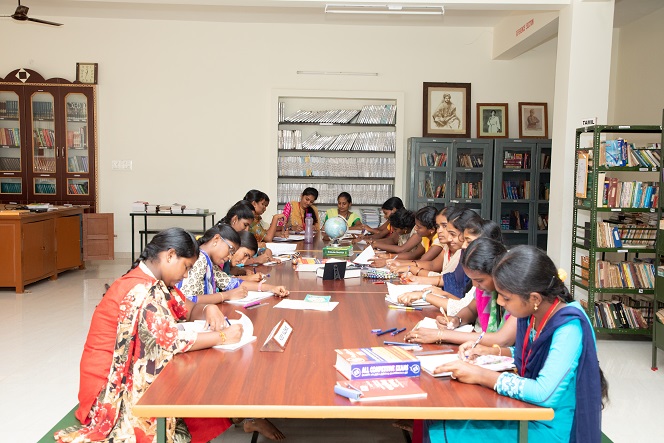
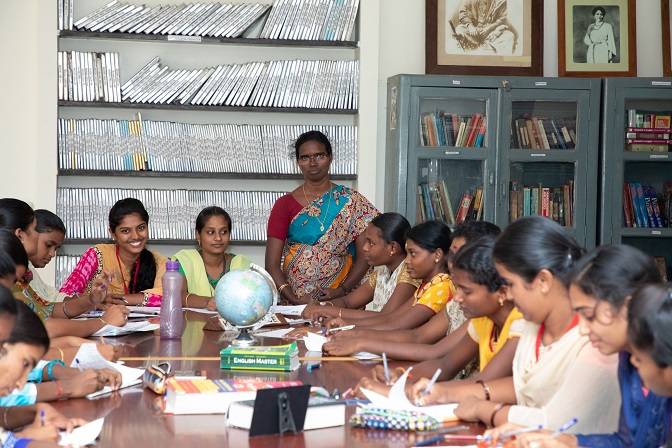
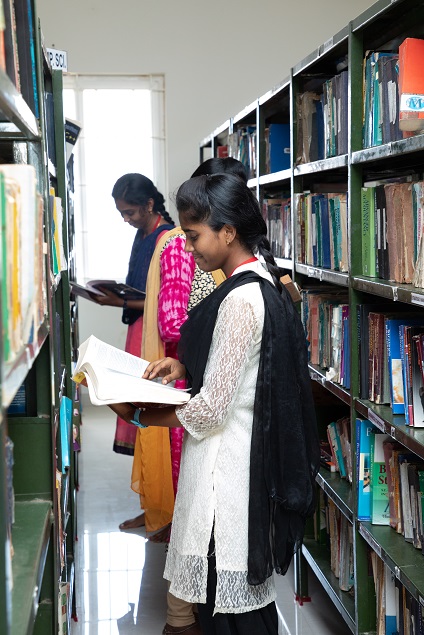
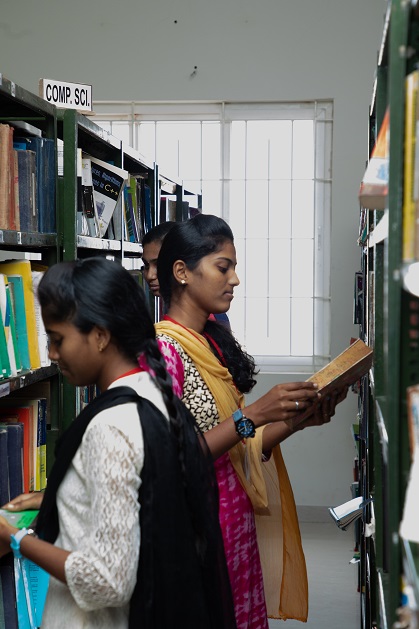
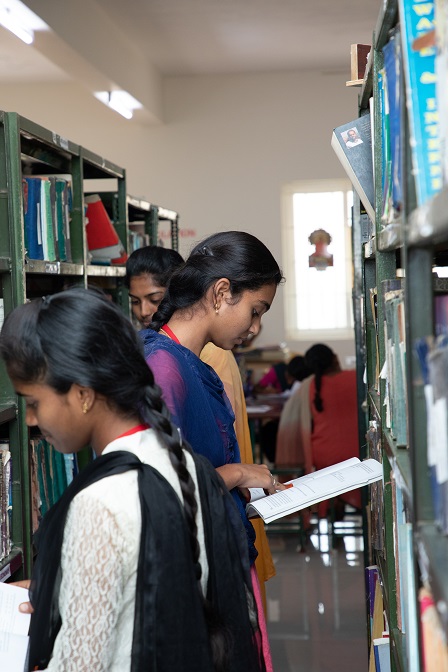
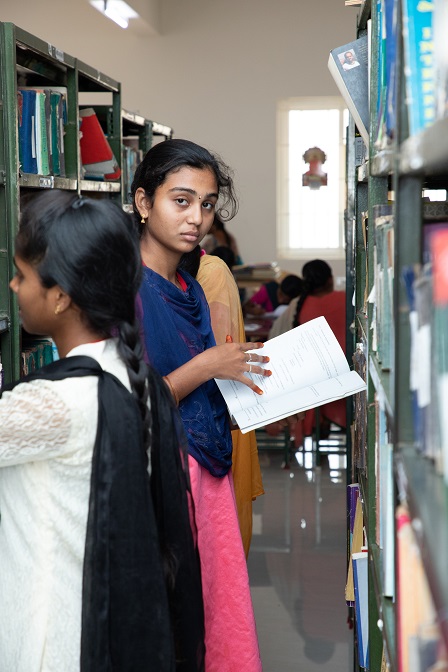
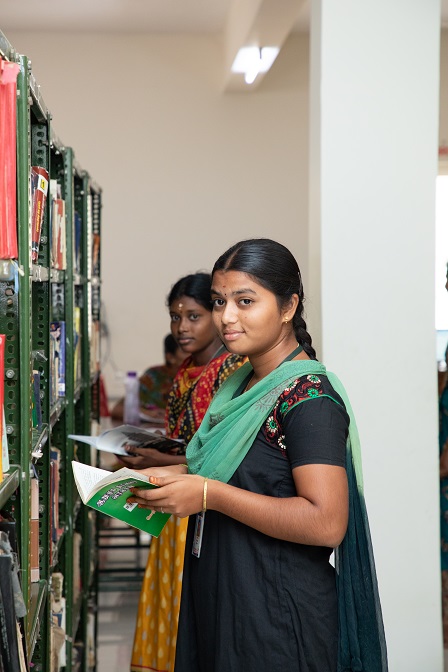
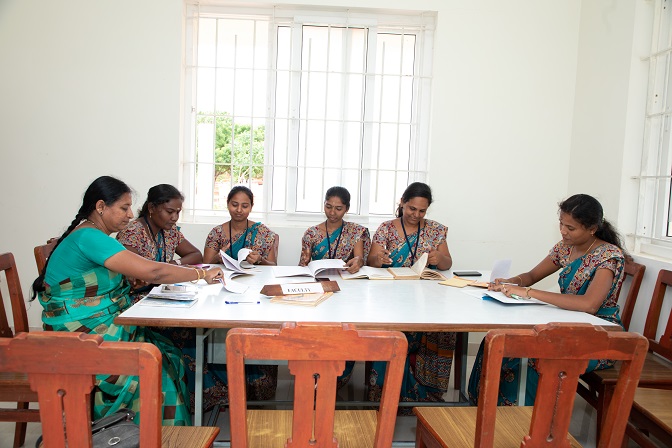
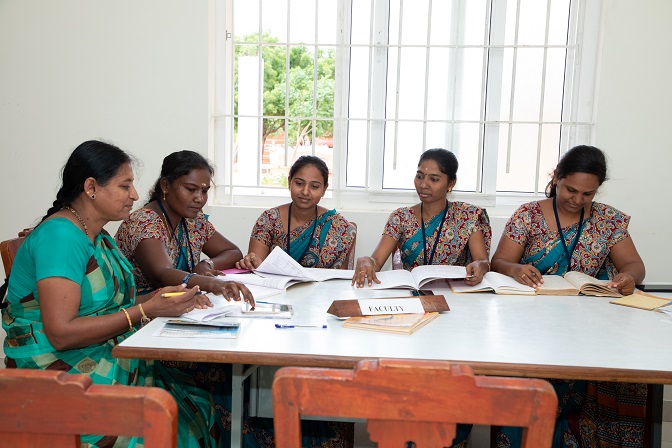
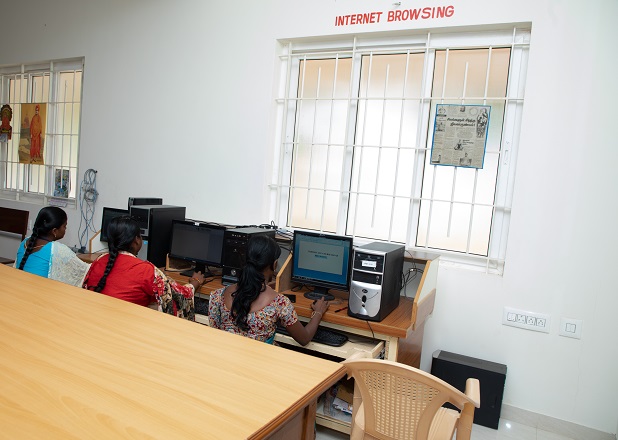
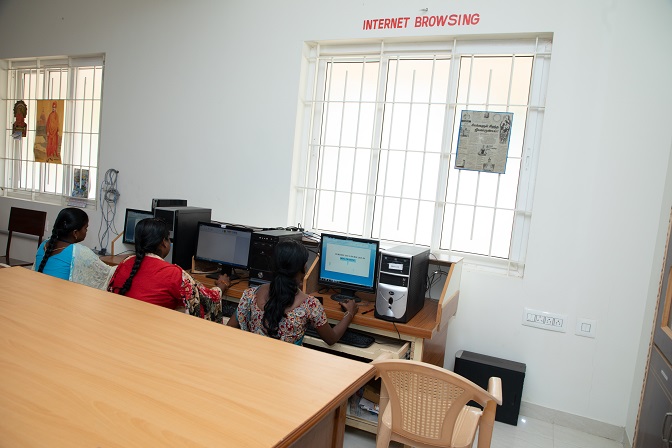
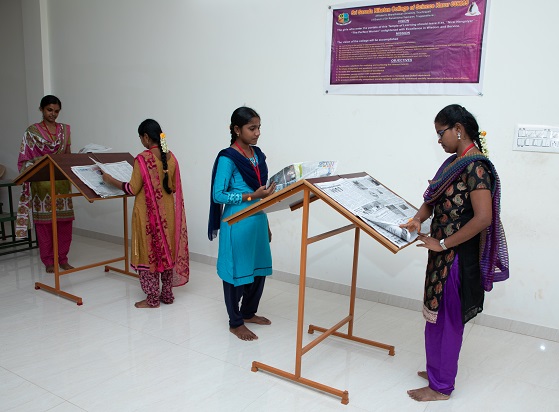
LIBRARY
Library plays a very vital role in an educational institution. This educational institution is fully committed in imparting of knowledge . It has the collection of 11,353 books , 31 magazines/Journals, Tamil, M.Com, Department Libraries. Book Banks books available at U.G departments.
Librarian:
Ms.P.Anitha M.L.I.Sc.,
There is a well equipped archive of library in the college, which has 25,000 books on various subjects. It also includes daily, weeklies, periodicals, and journals, magazines of business, science, technology and commerce.
Library Objectives:
To meet Dr. S.Ranganatha’s five laws of library science.
To encourage all students to work towards reaching their potential, by helping them to become independent and effective learner.
To support the curriculum of the college.
To enable students to have information retrieval skills from a wide range of resources including books, magazines.
To encourage them to experience success and enjoyment in the use of their library.
To develop awareness about reading habit and it’s importance and pleasure.
To provide opportunity and to encourage all student’s educational and recreational reading .
Five Laws of Library Science are:
Books are for Use.
Every Books Reader has his\her Book.
Every Book has its Reader.
Save the Time of the Reader.
Library is a Growing Organism.
Library Resources:
We have special collection of 4 Vedas, Sanskrit books, subject dictionaries, Gazetteers, Lexicons, encyclopedias and competitive exam books, maps, articles.
Summary Of Printed Resources:
Total Number of Books-11887.
Total Number of Indian Journals/Magazines -38.
List Of Journals:
Indian Journal of Marketing.
Indian Journal of Finance.
Scientific Transaction in Environment and Technovation.
Arthashastra Journal of Economics and Research.
Prabandhan: Indian Journal of Management.
Pramana Journal of Physics.
Resonance Journal of Science and Education.
ELT@I Journal of English.
Tamil Journals:
Amrutha.
Kaalachuvadu.
Kavya.
Uyirmey.
Library Services:
Circulation Services:
U.G.Students can borrow 2 books at a time & P.G. Students can borrow 3 books at a time. U.G. students are entitled to keep a book for 7 days from the date of issue and P.G. students for 15 days. At the end of the period the book should be returned to the Library. It can be renewed for another 7 days unless there is a request for the same book.
References Services:
Reference staff is available in the reading room to suggest sources of information and to assist in locating the required material.
Current Awareness Services:
Intimation sent to concerned department on right time.
Inter Library Lending Scheme(ILLS)
Our college students and staff can access the facilities available in the Library of local/ sister instititution and they can use our library resources services on mutual sharing basis.
Library Rules & Regulations:
The Library will be kept open from 8.30 a.m. to 6.00 p.m.
Absolute silence should be observed in and around the library premises. Students using the reading room should not disturb and distract the attention of the readers. Failure to observe this will result in severe disciplinary action.
Borrower’s ticket will be given to each student at the beginning of the course, A Student who borrows a book shall keep it well covered while it is in her use. She will be responsible for the books borrowed by her.
A Student who loses any book should make a written report of the same to the Librarian and Principal. She should replace the lost book.
TStudents should not carry any book or Printed matter into the Library. Only note books and loose sheets of paper are allowed inside the Library.
Students should not write, damage or make any mark on any book, periodical, manuscript or map belonging to the Library.
Sub- lending of college library books or exchange to tickets among students is strictly prohibited.
An overdue nominal charge of will be levied per day if the book is not returned on the due date.
Book s due falling on holidays may be returned on the next working day.
All books must be returned to the library on notified date, before the end of each semester, If any student fails to return the book on the date specified The issue of Hall ticket will be delayed to her until the book is returned with fine or replace if the book is lost.
Bags, Tiffin boxes and books must be left at the entrance of the library.
Absence from the college will not be admitted as an excuse for delay in the return of the book. Books will be issued or received from 8.45 a.m to 9.25 a.m., 1.00p.m. to 1.45 p.m. and 4.30 p.m. to 5.00 p.m.
When a book is received from the Library, it should be examined carefully. If there is any damage it must be immediately brought to the notice of the Librarian. Otherwise, the last borrower will be held responsible for the damage and should either replace the book or pay for the damage as fixed by the librarian/library committee.
The tickets and books borrowed from the Library should be returned when a student ceases to be a member of the college. Neither the transfer certificate nor the conduct certificate nor Hall Ticket will be issued to a student, who has not returned the books and the tickets issued to her.
The Librarian has the right to check each student before she leaves the library.
NPTEL
NPTEL is a program funded by MHRD,Govt of India under the National Mission on education through information and communication Technology to enhance the quality of education in the country by developing curriculum based video and web courses.Our institution provides NPTEL courses to both faculty and students.
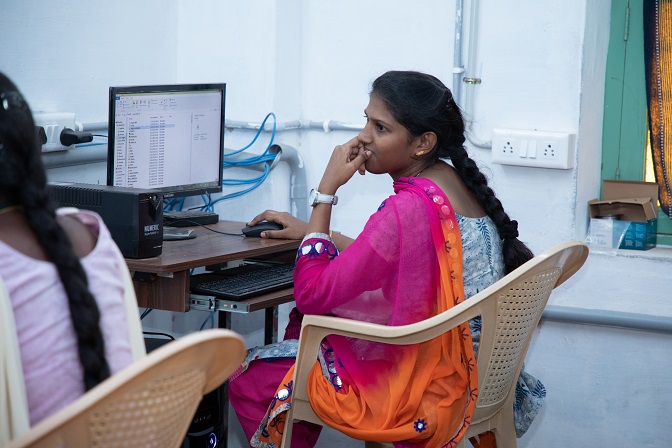
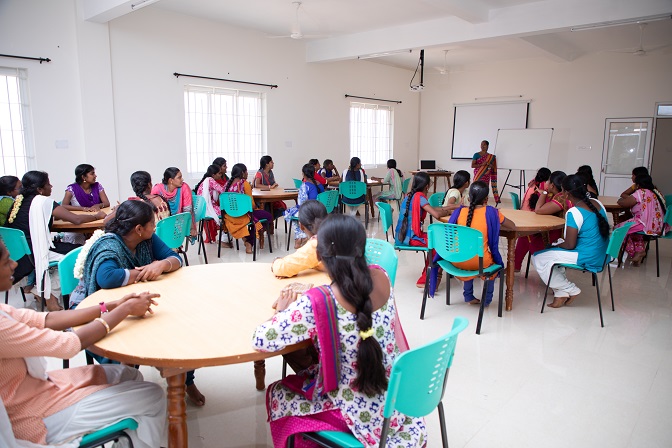
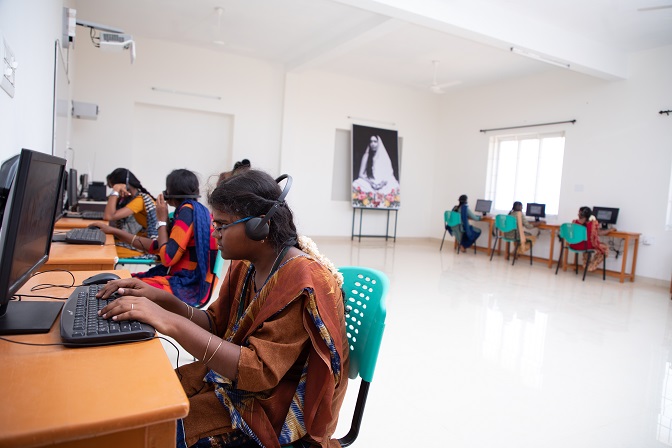
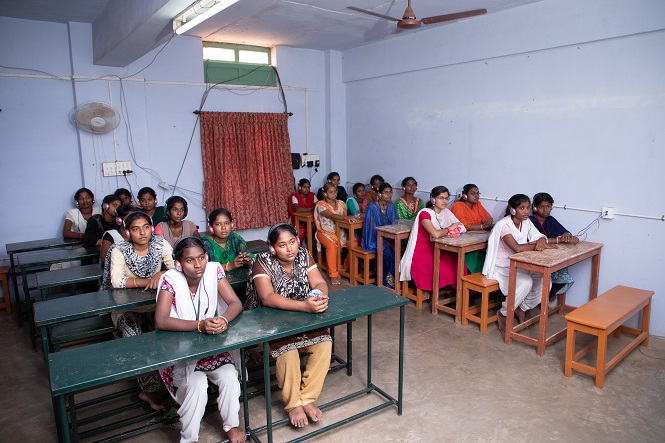
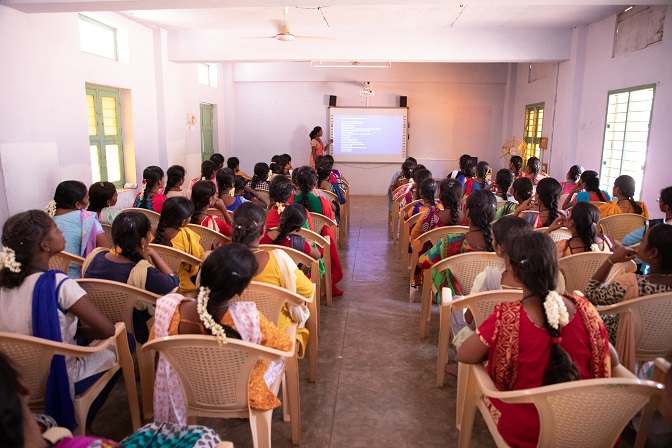
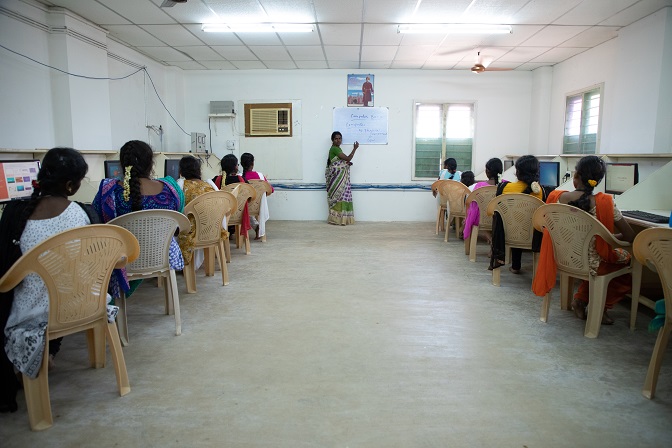
SMART CLASS
Quality education is an essential requisite in today's competitive environment. Technology has affected us in every aspect. Smart classes as a modernized method of education in Indian education scenario which provides quality education to students by helping them in better concept formation, concept elaboration, improvement in reading skills and academic achievement. A smart classroom is a classroom that has an instructor equipped with computer and audio-visual equipment, allowing the instructor to teach using a wide variety of media. These include smart interactive white board, DVD's, PPT's and more, all displayed through a data projector. Smart class is a digital initiative, which is rapidly transforming the way teachers teach and students learn. This makes learning an enjoyable experience for the students while improving their overall academic performance.
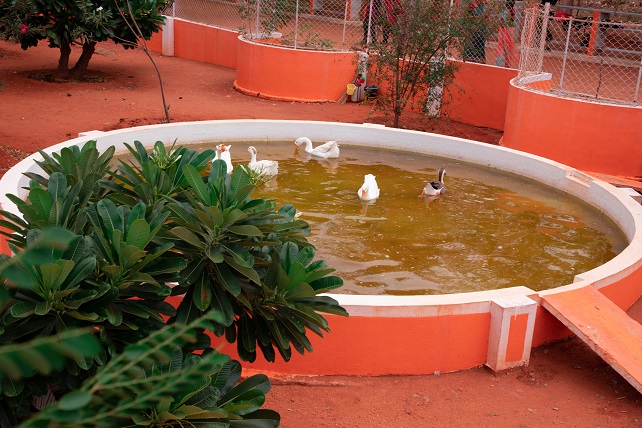
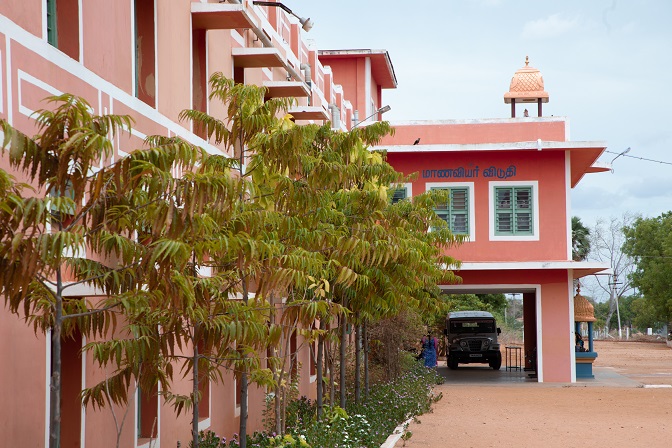
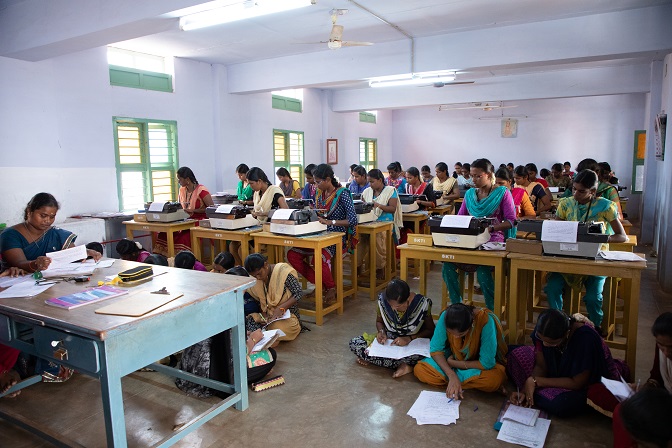
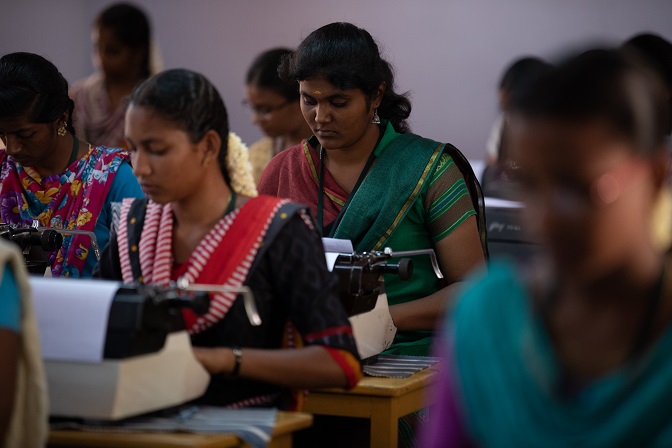
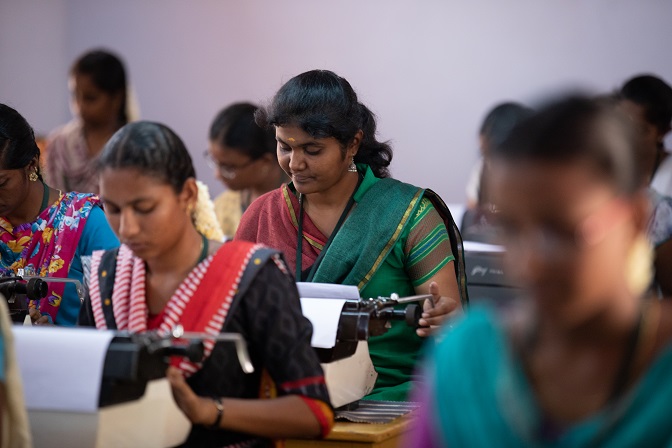
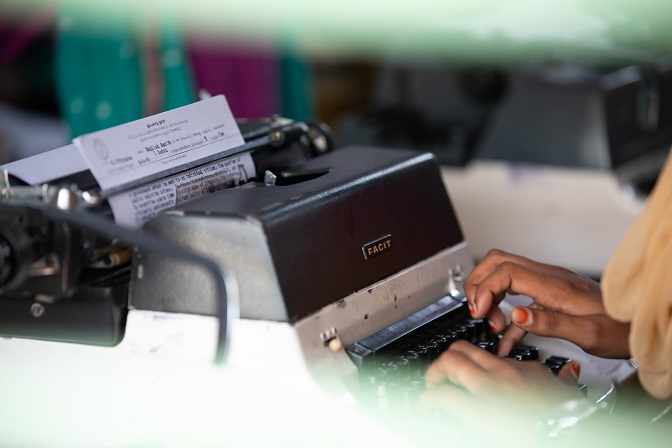
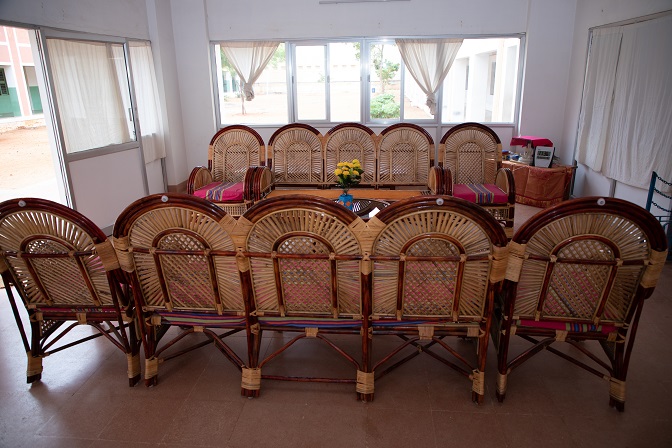
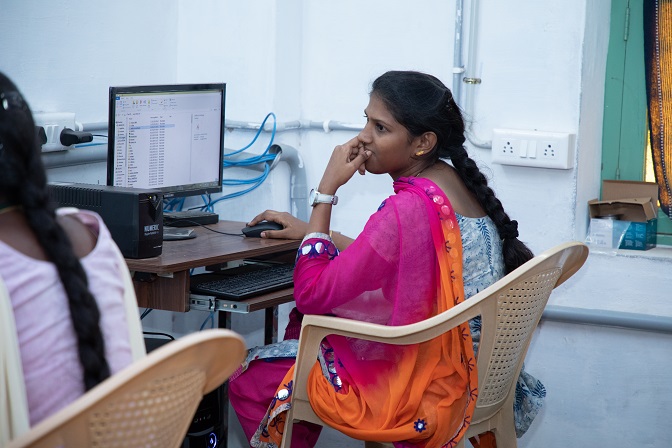
MATRU VIHAR
“Matru Vihar or Mother’s House” – the Sarada Niketan College Hostel is a home away from home for about 150 students, some of whom are students from neighbouring districts. As an important wing of the college it is actualizing the Life-Training Programme, the Hostel trains its residents in a well – planned daily routine suited to simple living and high thinking and a life of both self-reliance and community living as practiced in our ancient Gurukulum. The hostel residents have an active life dotted with organizing functions and festivals as well as maintaining strict discipline and devotion to studies.
View Hostel Rules and Regulations
HIGHLIGHTS:
Early Rising, Surya Namaskar, group work like Vegetable Cutting, Cleaning the Temple, Collecting Flowers for Pooja and Serving Food.
5 hours a day for study at prime dawn and dusk timings.
Convenient rooms, clean toilets and bath rooms with plenty of water available round the clock make the stay a pleasant experience.
An excellent Vegetarian mess runs, giving good nutritious food at a nominal fee. Vegetables and fruits grown in our campus are used at reduced price thus reducing the expenditure. Good, unadulterated milk is supplied from the Sarada Gokulam, the dairy maintained by the Management in the campus..
The Principal is the Warden assisted by the Sisters and Ambas of the Samithi in monitoring the attendance and the observance of the daily routine of the students.
Concession for the Poor : Financially weak students avail financial assistance in the form of fee concessions from the management.
Rules and Regulations – Guidelines:
Students are not permitted to have cell phone in the hostel premises. If any student is found with cell phone they may be DISMISSED from the college.
The hostel Leader, Assistant Leader and Group Leaders are elected by the members. They will help the Warden, assisted by the leaders of the various committees, in fulfilling students needs and in maintaining discipline in the hostel.
Students will be divided into groups and assigned special duties like serving meals, campus cleaning, temple work and vegetable cutting. Each group should discharge all these duties allotted by turn.
Students should be punctual for prayers, meals, assemblies, classes, study etc.
Rooms should be kept neat and tidy. All items of furniture should be used with care. Breakages and damages should be reported immediately to the warden.
Students should occupy the rooms assigned to them. They may not be asked to change their rooms without any proper reasons for it.
Entering another one’s room is strictly forbidden.
Lights in the rooms should be switched off between 10.00 p.m. and 4.45 a.m. and silence should be observed during that time.
Students should not wear costly jewels. They are advised not to keep huge money. The hostel authorities cannot be held responsible for any loss of money, valuables or belongings of the students.
Students are advised not to lend or borrow money from anybody in the college or hostel.
Subscription of any kind should be collected only with the Principal/Deputy warden’s permission.
When the students go home for the general holidays parents should come to take them home.
Absence from the hostel may be allowed on the written request of parent/ guardian, if the reason is valid. But parents should come to take the student home.
Except in case of illness, food should not be taken to the rooms.
Students are not allowed to enter the kitchen. They are not permitted to have any contact with the cooks, servants, peons or watchman/watchwoman.
Only parents or guardians and relatives permitted at the time of admission can see the student. Brothers are not allowed as visitors.
Visitors should not enter the hostel rooms.
Day students are forbidden from entering the hostel.
Students should not accompany the visitors to the gate..
Students are strictly forbidden from defacing the walls, throwing waste papers, rubbish etc. on the floor or tampering with electrical fittings, bulbs, trees and plants in the campus or damaging any hostel property.
Study Hours: The inmates should maintain complete silence and study well during study hours. Visitors are not permitted during study hours.
Hosteller should not remain in the hostel taking leave without any information to the concerned authorities.
Misconduct or break of any hostel rules or disobedience to the authorities will render the offender liable to fine or dismissal.
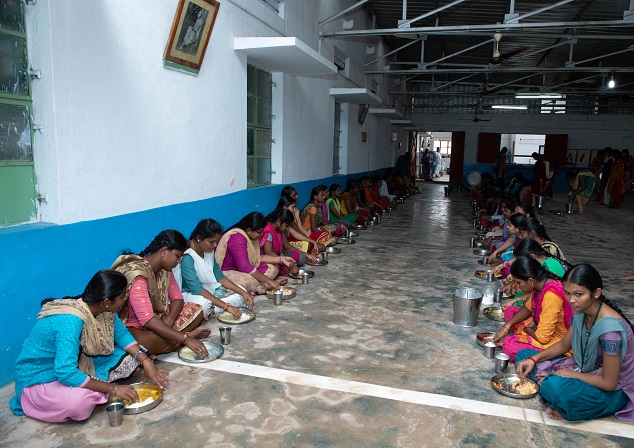
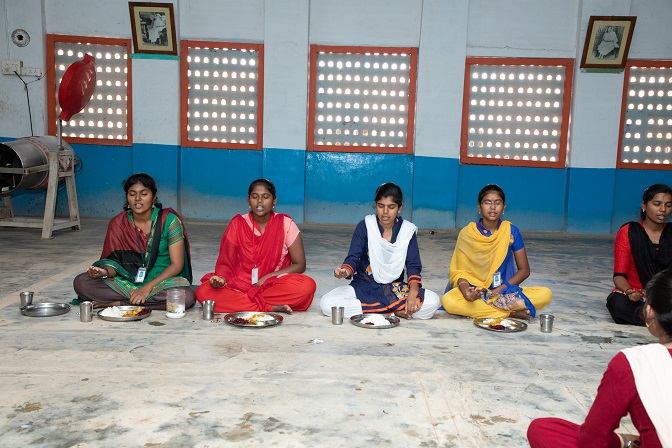
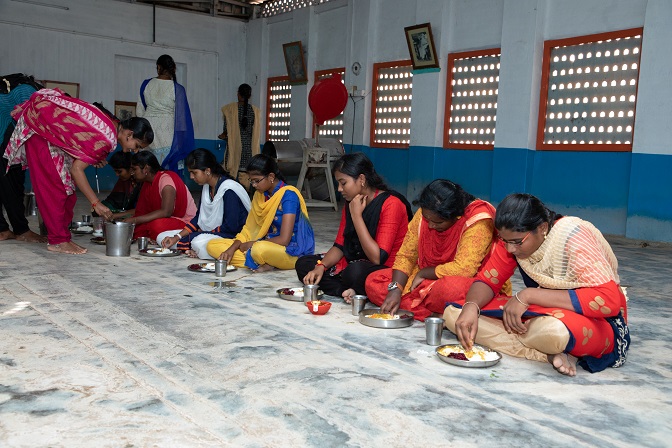
MESS & CANTEEN
CANTEEN:
A canteen cum general store is available at the college premises with basic requirements for refreshing and for academic requirements .A hygienic wet and dry canteen serves healthy food and all basic stationaries
FREE TRANSPORT
Most of the students are coming from rural areas where transport facilities are often. Hence, our college provides free transport facilities to all the students .Our blooming transport facilities ensure that the students and staff can reach college in time and ease. The buses are also provided for field trips, educational tours and industrial visits.
